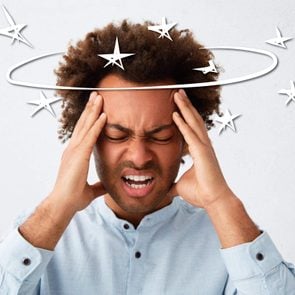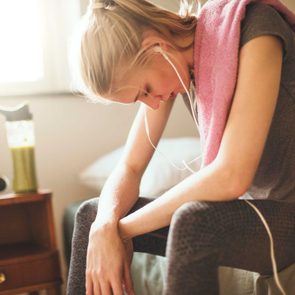Here’s Why You Get Dizzy When You Stand Up Too Fast
Updated: Sep. 03, 2020
If this happens more than occasionally, speak with your doctor.
Standing up too quickly and feeling like you’re spinning is always unsettling. It might happen when you first pop out of bed in the morning or if you’re sitting and you get up suddenly out of your chair. Some people even experience it after they’ve eaten a large meal. As many as 20 percent of people over 65 experience this sudden dizziness, referred to as orthostatic (or postural) hypotension.
Although the initial dizziness could be a little frightening, how serious it is will primarily depend on how often it occurs, says Nadia Sutton, MD, an interventional cardiologist at the University of Michigan’s Frankel Cardiovascular Center.
What causes dizziness when standing up?
Dizziness after standing up too fast usually has to do with blood pressure. “When you stand up, gravity comes into play, and blood tends to pool in the lower part of your body,” Dr. Sutton says. Orthostatic hypotension or postural hypotension is when the blood pressure to the upper part of the body—especially the head—drops when you stand up, causing feelings of dizziness or lightheadedness. (Here’s how to remedy low blood pressure at home.)
“Normally, blood vessels in the upper part of the body tighten or constrict when you stand up in order for blood pressure to remain stable,” she says. If your blood pressure is low to begin with, you might be more likely to experience symptoms of dizziness when you stand thanks to poor circulation to your head. But Dr. Sutton says this is usually short-lived. “Once your blood vessels adjust to standing up, symptoms of dizziness should go away,” she says. (Here are 8 medical reasons that could be making you feel dizzy.)
Many things can impact blood pressure including dehydration, heart conditions, and neurological problems, according to Dr. Sutton.
For some people, this can involve baroreceptor dysfunction, adds Nesochi Okeke-Igbokwe, MD, New York City area-based physician. The baroreceptor reflex helps regulate sudden changes in blood pressure; issues with the reflex could contribute to problems with recurrent orthostatic hypotension, she says.
Many medications can have an impact on blood pressure, so in some cases your doctor may be able to lower your dosage, swap out medicine, or discontinue drugs you may no longer need.
How to avoid getting dizzy when standing
Some people are generally more prone to developing symptoms of dizziness when standing, Dr. Sutton says. If this happens with you, remind yourself to pause a moment before standing, letting your body adjust to gravity. If you experience dizziness after eating, try smaller but more frequent meals, recommend Harvard health experts. Light exercise in the morning also can help get your blood pressure up.
If this only happens occasionally, there isn’t a reason to worry. But it’s a good idea to speak with your doctor if this is a new or an ongoing problem. Complications of ongoing symptomatic orthostatic hypotension include an increased risk of fainting and recurrent falls that could lead to fractures, especially in older people. There is also the risk of stroke if the blood supply to the brain is frequently compromised, Dr. Okeke-Igbokwe says.
















